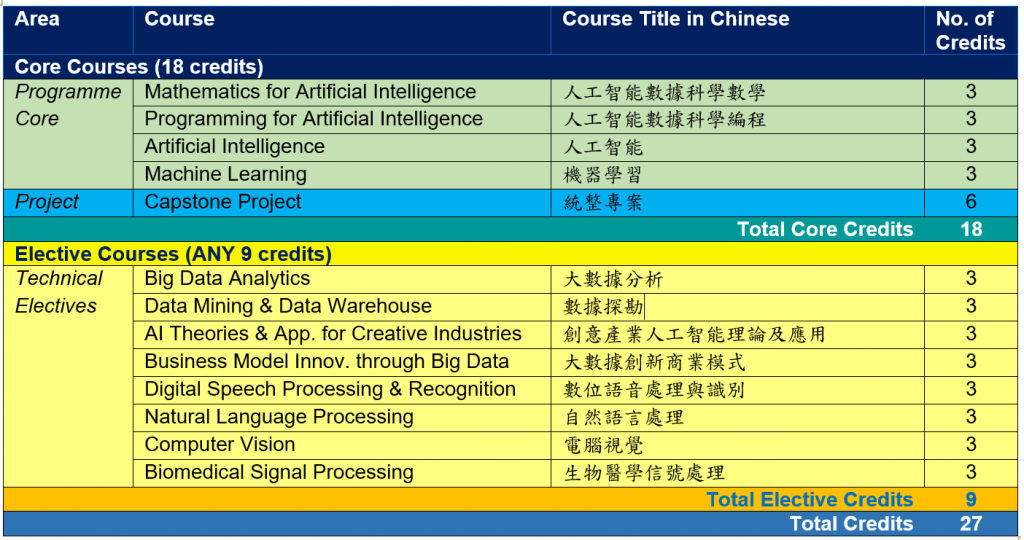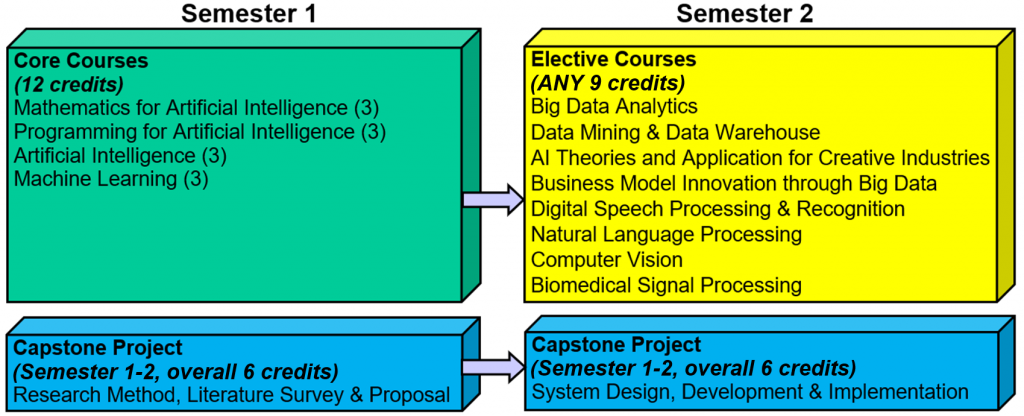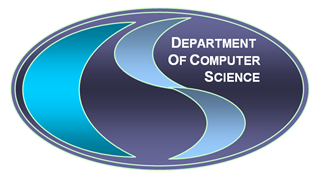
The proposed programme aims at imparting theoretical and practical knowledge, along with the design and implementation skills, in the area of artificial intelligence (AI) to serve the increasing demand of AI professionals in the fast-changing technology world. The programme core courses cover essential mathematics and programming for Artificial Intelligence, foundation knowledge of AI and state-of-the-art machine learning. The programme is unique in that it combines the application elements of artificial intelligence in the creative industries and science and engineering. From hosting team members, the Department of Computer Science and the Department of Journalism and Communication (one of the College’s niche areas), students will learn key concepts, theoretical paradigms and cutting-edge research methods across the interdisciplinary fields of AI, creative media as well as science and engineering applications. After graduation, students can pursue academic research in the area of AI or develop career as an AI Software Engineer, Machine Learning Engineer, Data Analyst and AI Project Manager.
- PO1 Develop competence in the mastery, critical reasoning, analysis, evaluation and social impact analysis of artificial intelligence systems.
- PO2 Develop application knowledge and understanding in artificial intelligence system.
- PO3 Develop critical and problem-solving skills for complex and abstract professional problems, help meeting the needs of organizations and shareholders and to face challenges in the fast technology changing working environment.
- PO4 Develop advanced knowledge and skills in making systematic use of investigation to discover new knowledge and technologies in artificial intelligence.
- PILO1 Analyse and evaluate the artificial intelligence systems.
- PILO2 Appreciate the influence and impact; explain the core concepts, principles and theories of artificial intelligence system and the components.
- PILO3 Implement artificial intelligence systems to solve scientific, technological, and business problems and can contribute to professional leadership.
- PILO4 Pursue research or innovative applications in the field of artificial intelligence.
Graduates of this Programme can pursue further study in other areas via enrolment in research-based programmes (e.g. MPhil) offered by local and overseas universities.
AI Software Engineer, AI Programmer, Business Intelligence Developer, Machine Learning Engineer, Data Analysts/Scientist, Data warehouse engineer, Research in artificial intelligence, AI Project Manager, AI System Analysts
The programme is designed with four core subjects and two professional streams:
- 1. Science and Engineering
- 2. Media and Innovation Applications
Students will be able to choose from either of the two streams. Those interested in technology-oriented subjects can select from the “Science and Engineering” stream, while those inclined towards business and media-oriented subjects can choose from the “Media and Innovation Applications” stream. The normal period of study is 1 year for full-time students and 2 years for part-time students. The maximum period of study is 2 years for full-time students and 4 years for part-time students. The entire master’s programme can be completed in two regular semesters (Fall, Spring, and Summer Semester are available for selection). Students will be able to take any courses offered in each semester, the study schedule for the proposed Master programme is summarized in the following table.
In the first semester, students will take 12 credits of Programme Core and the first part of Capstone Project (PJ). In the second semester, students will take 9 credits of Technical Electives (TE) and the second part of Capstone Project. Graduation requires the completion of 27 credits with Graduation Grade Point Average of 2.0 for graduation within the maximum period of study.


The course is conducted in Chinese (supplemented with English materials).
- One-year full-time program
- Two-year part-time program (only available to local students)
- Hold a recognized bachelor’s degree in science, engineering, business, finance, cross-media, or related disciplines; or
- Hold a bachelor’s degree in other disciplines and have studied university-level linear algebra, calculus, probability theory, statistics, and computer programming; or
- Equivalent qualifications; and
- Chinese language proficiency requirements
- Achieve Level 3 or above in Chinese Language in the Hong Kong Diploma of Secondary Education Examination (HKDSE); or
- Achieve Level 5 or above in the HSK (Hanyu Shuiping Kaoshi); or
- Achieve Level 2-B in the Putonghua Proficiency Test conducted by the National Language Commission; or
- Other proof of Chinese language proficiency
- English language proficiency requirements
- Achieve a score of 425 or above in the College English Test Band 4 (CET4) of the People’s Republic of China; or
- Hold a bachelor’s degree from a university where English was the medium of instruction and/or examination; or
- Equivalent qualifications as stated above.
First Round: November 1, 2024 – January 24, 2025
Second Round: February 10, 2025 – April 30, 2025
(If Round 1 is fully enrolled, Round 2 will not be open)
August 1, 2025 – October 10, 2025
(If all seats are filled during Fall Admission, Spring Admission will be suspended.)

